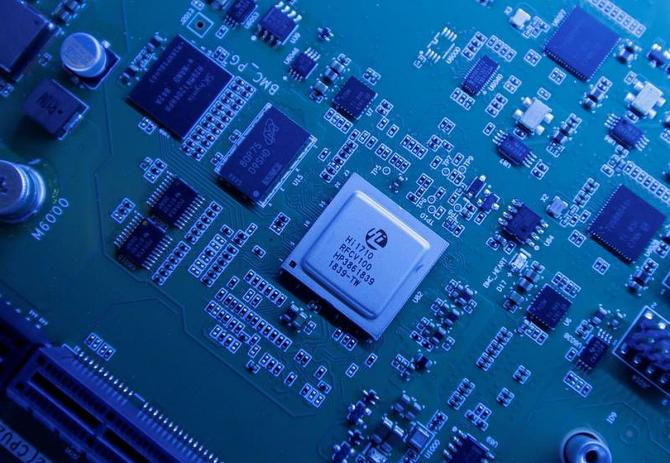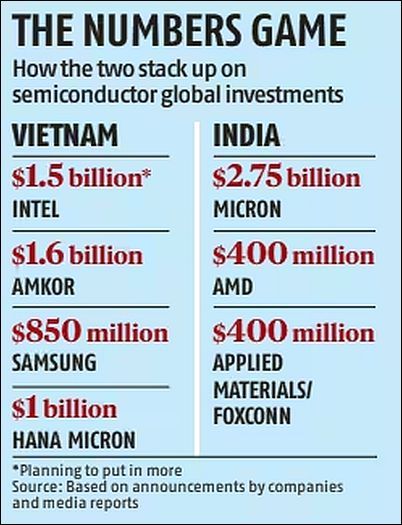India and Vietnam are vying with each other to woo semiconductor companies to their country.

With the tension between the US and China escalating, and Taiwan getting vulnerable both countries are trying to present themselves as alternative destinations for global players.
Vietnam, which started the effort as early as 2010, has got a leg-up after US President Joe Biden’s visit last month.
The occasion saw the announcement of many semiconductor projects, including a $1.6 billion project by the outsourced semiconductor assembly and test (OSAT) company Amkor Technology.
Amkor has chosen Vietnam to set up its second largest plant in the world, and the first phase of the project rolls out in October.
It also announced investments by chip design majors like Marvel and Synopsys.
 Vietnam has garnered investments of over $5 billion in the semiconductor space, which have been publicly announced or are in various stages of implementation.
Vietnam has garnered investments of over $5 billion in the semiconductor space, which have been publicly announced or are in various stages of implementation.
These include investments from diverse big-ticket players as Intel, Samsung, Hana Micron, Dutch suppliers to chip manufacturers, ASML, Infineon Technologies, Korean giant SKC, and so on.
India, which started pitching itself as an alternative to China only a couple years ago, is making an aggressive bid to catch up.
It has closed a big $2.75 billion investment from Micron for an advanced therapy medicinal products (ATMP) plant, while the US semiconductor company, Advanced Micro Devices (AMD), has announced an investment of $400 million over 4 years in an engineering centre in Bengaluru.
What’s more, Applied Materials, another supplier to the semiconductor industry, has tied up with Foxconn to set up a $250-million chip-making tools project.
However, neither Vietnam nor India has been able to close a deal with global foundries to set up a fab plant in their respective country, which require investments ranging from $5 to $9 billion.
Whichever country manages to pull it off first will have a big advantage.
During Biden’s visit, the US not only upgraded its relationship status with Vietnam, but also signed an agreement to provide initial funding to improve semiconductor skills in the country.
Also, the US has offered Vietnam $100 million a year for five years under the CHIPS and Science Act for building semiconductor supply chains.
South Korean companies have been very active in Vietnam.
In India, though, only SK Hynix has shown an interest in setting up a packaging plant.
That is because with the Chinese market slowing down, Vietnam has become a global hub for electronics, IT and mobile devices as companies shift production from China to that country, which is also a big market for semiconductors.
For example, Samsung is setting up the highly complex semiconductor substrate factory in Vietnam with an investment of $850 million.
Hanmi Semiconductor, a Korean chip equipment maker, has also set up a local subsidiary to leverage the growing demand from semiconductor companies in Vietnam.
And while chip maker Hana Micron is investing up to $1 billion till 2025 (it has already put in major investments) in a chip packaging and testing plant in the country, the SKC Group has signed up to explore potential investments for semiconductors, amongst others.
Says a senior executive of a top global auto company, "We have asked Taiwanese OSAT players to diversify their production from China and Taiwan to other countries to avoid possible supply chain disruption.
"Most of the top Taiwanese companies have started looking at Vietnam, the Philippines and Malaysia, But India is still not in their map.”











